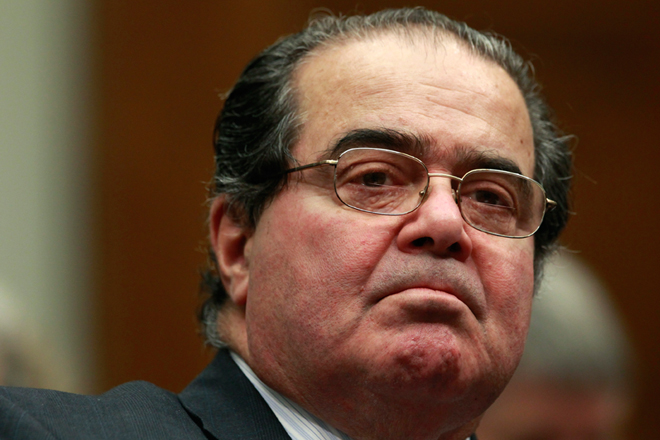If the Supreme Court overturns part or all of the Affordable Care Act in the coming week, it’s likely to do so by a 5-4 vote, in which case most of the attention will focus on Anthony Kennedy, the Court’s so-called swing justice. But the harshest spotlight should shine on Antonin Scalia, who, as a practical matter, must be part of any vote to strike down the law. (Justices Breyer, Ginsburg, Kagan and Sotomayor are certain to vote to uphold the ACA.)
The argument against the ACA is that it supposedly exceeds Congress’s power to regulate interstate commerce. The problem for Scalia is that in 2005 he voted to uphold a far more expansive federal law – one that criminalized the cultivation of medical marijuana for purely personal use in a state where doing so was legal. In that case, Scalia wrote that, “where Congress has authority to enact a regulation of interstate commerce, it possesses every power needed to make that regulation effective.”
Since no one doubts that the healthcare industry involves interstate commerce and that Congress has the power to regulate it, Scalia would seem committed to upholding the ACA – which is perhaps the main reason conservative legal academics have spent the last couple of years inventing a fanciful distinction between regulating interstate commerce and “requiring” people to engage in it. Such a distinction would allow a judge who accepted it to distinguish the ACA from the law upheld by Wickard.
It now turns out that these herculean intellectual labors were unnecessary. In a forthcoming book, Scalia disowns Wickard v. Filburn, the 70-year-old precedent on which his 2005 vote was explicitly based. (Wickard found that Congress could regulate the growing of wheat for personal consumption, since doing so affected the broader interstate market for the commodity.) Wickard, Scalia now says, “expanded the Commerce Clause beyond all reason.”
The cynical interpretation of Scalia’s flip-flop is that he follows precedents when he likes the results they yield and doesn’t when they don’t. This, in fact, is a fairly accurate, if not wholly infallible, formula for predicting Scalia’s judicial behavior, but I believe it’s a misinterpretation of his beliefs.
Scalia’s whole academic and judicial career has been built around maintaining a strict division between, on the one hand, the Rule of Law (the capitalization is his), and, on the other, the grubby world of politics. Politics is the business of politicians, while law is for the judges.
I’ve been reading Scalia’s work for 25 years. I have discussed it with him on a few occasions, and, to the extent one can ever be confident about this sort of thing, I am confident that he truly believes in this distinction and tries to adhere to it. The problem is that it’s an impossible distinction to maintain. Worse yet, sincerely believing that it’s possible to do so produces a kind of judicial blindness that is ultimately more dangerous than a cynically self-conscious manipulation of legal rules.
Take Scalia’s reversal regarding Wickard. As a judge in our legal-political system, Scalia is required to employ what lawyers call stare decisis – the principle that the rules laid down in judicial decisions should be followed in subsequent decisions unless there is a compelling reason to overturn the existing precedent. This principle is supposed to apply with special force to “well-settled” precedents – that is, decisions that have been adhered to with little or no controversy for many years.
That is a perfect description of Wickard – a case that for many decades was so uncontroversial that any suggestion it should be overturned would have been treated as nothing less than bizarre and, indeed, as an attack on the fundamental structure of the modern administrative state.
Justice Scalia spent his career as a lawyer, law professor and judge in that legal world – a world in which Wickard was no more eligible for serious reconsideration than Brown v. Board of Education or Marbury v. Madison are today. It ought to be obvious that if someone like Scalia can, at this point in a half-century-long career, decide that Wickard isn’t a binding precedent, then the idea of binding precedent is essentially empty, which in turn highlights the inevitable emptiness of the idea of any useful distinction between law and politics.
But this is not obvious, least of all to Justice Scalia, who I have no real doubt actually believes the things he says and writes, no matter how many times his public acts contradict his avowed beliefs. Scalia believes in a version of the rule of law whose existence is refuted by nothing so well as his own career. And that ultimately is more disturbing than a career dedicated to the most self-consciously manipulative Machiavellianism.

